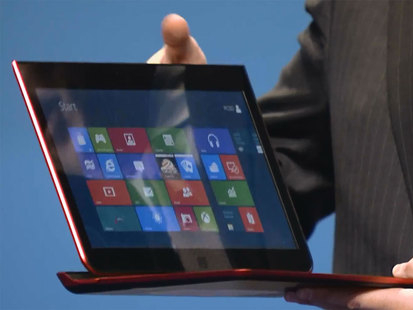Microsoft Actively Involved with Windows 8 Ultrabook Design
Microsoft is reportedly requiring hardware specifics when creating a touch-based Windows 8 Ultrabook.
Get Tom's Hardware's best news and in-depth reviews, straight to your inbox.
You are now subscribed
Your newsletter sign-up was successful
Unnamed industry sources report that Microsoft is actively involved with Ultrabook manufacturers to make sure that the chassis, screen and keyboard work smoothly with Windows 8. Like Intel, Microsoft expects a certain level of quality when interacting with the upcoming touch-based OS, and doesn't want anything to distract the user away from a first-class Windows 8 experience.
Typically clamshell covers of traditional laptops shake when the user touches the screen. Microsoft doesn't want this to happen -- it wants a sturdy display as if the end-user is touching a solid tablet or all-in-one PC. To solve the issue, sources claim the Redmond company has raised the specification of touch-enabled hardware and is addressing the chassis concerns with Ultrabook manufacturers. Naturally if these manufacturers can't/won't meet Microsoft's strict list of expectations, they'll likely be stuck licensing Windows 7 instead.
Just last week we saw Intel demonstrating a super-thin prototype Ultrabook called Letexo that could be used in three ways: as a tablet, as a makeshift AIO PC, and as a standard clamshell notebook. So far very little is known about Letexo other than it's based on Intel's Ivy Bridge Ultrabook platform. Other features seen in product images include an HDMI port and a pair of USB ports. There's also no indication that manufacturers have even signed on to produce products based on the Letexo design.
As seen last week, Letexo's screen slides forward and sits flush on top of the keyboard, creating one streamlined tablet-like device. To create an AIO PC, the screen can be pulled forward in front of the keyboard and propped up with a stand. Sources claim this 3-way design will be the answer to Microsoft's concerns: one that folds, slides and reverts back to clamshell.
That said, Microsoft may have had something to do with Intel's prototype shown last week. Both the new chassis design and Microsoft's Metro UI is expected to boost the effectiveness of Windows 8 despite seemingly alienating the mouse/keyboard consumer. Also expected is a boost in the ratio of touch-enabled Ultrabooks with a display size of 13-inchs and above to 30-percent sold by the end of 4Q12. Previously only 3 to 5-percent were estimated to be touch-based Ultrabooks.
Get Tom's Hardware's best news and in-depth reviews, straight to your inbox.

Kevin Parrish has over a decade of experience as a writer, editor, and product tester. His work focused on computer hardware, networking equipment, smartphones, tablets, gaming consoles, and other internet-connected devices. His work has appeared in Tom's Hardware, Tom's Guide, Maximum PC, Digital Trends, Android Authority, How-To Geek, Lifewire, and others.
-
After playing with Windows 8 for a bit I keep wanting to touch my laptop screen. This is exactly what I am looking for in my next laptop.Reply
-
CaedenV nayraAfter playing with Windows 8 for a bit I keep wanting to touch my laptop screen. This is exactly what I am looking for in my next laptop.I have a touch netbook with win8CP and while it took a week to get accustomed to using the touch screen I now find myself using keys and screen instead of the traditional keys and mouse/pad.Reply
Ironically, while wasting time at a store the other day I saw an AIO desktop machine (HP?) with a touch screen... absolutely useless. While I can use the netbook touchscreen for hours, it only took 2-3 minutes before my arm started feeling a little burn on the desktop. I am sure I would get use to it a little over time, but anything above a 12" screen is not going to be very touch friendly because you have to move your whole arm instead of just moving your fingers/wrist a little. Especially as I get a little older I am becoming a little more sensitive to moving my shoulders a whole lot.
It is the difference between a hand gesture on the small screen vs actual movement/work on the big screen. Also the reason the wii motion controllers are so popular which are gesture based, compared to the xbox/PS3 motion controllers which are more motion tracking based. Both are better at different things, but when it comes to constant use it is far easier/more effective to do simple gestures instead of doing the actual movements. -
alxianthelast And here I am saying Microsoft has no hardware ambitions. And why did they cancel Courrier then when it should be the windows 8 poster child? Did it fail these certification criteria?Reply
They have no hardware 'performance' ambitions then, while dictating user experience and pointless meddling with the design, which should the manufacturers job, must be much more important than just building a good OS. -
dreadlokz what about windows8 DESKTOPS? like 75% of the windows8 future devices? thats just ridiculous!Reply
